Visit Honolulu’s Downtown district in Oahu

Visit the Heart of Honolulu: Exploring Downtown’s historic district and urban charms
We explore the Honolulu district and attractions. In this short guide, we feature all the cultural and historic treasures, museums, capital monuments and buildings to explore in the area.
Welcome to the bustling epicenter of Honolulu, where urban energy and cultural heritage converge in a vibrant tapestry of sights, sounds, and flavors.
Honolulu Downtown beckons with its dynamic atmosphere, historic landmarks, and a myriad of shopping, dining, and entertainment options. From the iconic Aloha Tower to the lively streets of Chinatown, this urban hub invites you to immerse yourself in the heart of Oahu’s capital city.
Downtown Honolulu offers a unique blend of modernity and tradition as you embark on an unforgettable journey through Honolulu’s downtown district for visitors to explore.
Downtown Honolulu is the seat of the business district of the city but is also the center of the historic and cultural part of the city with so many important treasures to visit when you have the time to delve into Hawaii’s historic past.
Quick Plan your Honolulu Itinerary
Are you in a rush on a last-minute trip to Honolulu? Well then, try our jump start guide to book the best tours and hotels
below.
Pro Tip – Since you are planning to visit Diamond Head and Waikiki tour here to enjoy with great views and tour of Waikiki Beach.
Top Tours to Try in Honolulu
Complete Pearl Harbor Experience – Day Trip Tour
Grand Circle Island Tour – Top Rated
Sunset Cocktail Cruise – Easy tour with pick up
Where to Stay in Honolulu
Ilima Hotel – Budget Option , Personally tried
Holiday Inn Express Waikiki – mid range
Halepuna Waikiki – Honolulu luxury hotel or resort

Best things to do in Honolulu’s Downtown district from historic to cool attractions to explore
The important cultural treasures are all centered here starting with the iconic and impressive Iolani Palace, Washington Square, Ali’iolani Hale, the King Kamehameha statue, the Kawaiaha’o Church, and so many other historic treasures all centered around downtown.
You’ll also find amazing museums like the Honolulu Museum of Art, and the Hawaii State Museum of Art all in the central downtown area to explore and visit.

History of downtown Honolulu
All of these historic buildings in downtown Honolulu were part of the economic and governmental rule of Hawaii since the early time frame of Hawaiian Royalty living in this historic area. You will find the seat of the states governmental body centered at the State Capital Building, Honolulu Hale or the City Hall, Ali’iolani Hale or the State Supreme court and Washington Place the governor’s mansion or the previous home of the last queen of Hawaii, Liliuokalani.
Downtown Honolulu is broken into four districts comprising of Chinatown, the waterfront area, the Historic Capital district and the Central Business District.
How to get to downtown Honolulu
There are several convenient ways to reach downtown Honolulu, ensuring easy access to the heart of the city. Here are a few transportation options to consider:
Honolulu International Airport: If you’re arriving by air, Honolulu International Airport is the main gateway to the city. From the airport, you can take a taxi, ride-share service, or airport shuttle to downtown. The journey typically takes around 15-20 minutes, depending on traffic.
Public Transportation: The public bus system, known as The Bus, offers an affordable and efficient way to reach downtown Honolulu. Look for bus routes that specifically mention “Downtown” or “Ala Moana Center,” which is a popular shopping destination near downtown. Be sure to check the bus schedules and plan your trip accordingly.
Rental Car: Renting a car gives you the flexibility to explore downtown and the surrounding areas at your own pace. Several car rental companies have offices at the airport, and the drive to downtown is straightforward via Interstate H-1. However, keep in mind that parking in downtown Honolulu can be limited and expensive.
Taxis and Ride-Share Services: Taxis are readily available at the airport and throughout the city, providing a convenient door-to-door service. Alternatively, ride-share services like Uber and Lyft are widely used in Honolulu and offer a convenient and often cost-effective transportation option.
Walking: If you’re staying in a hotel or accommodation near downtown Honolulu, you may be able to reach downtown on foot. The exact walking distance will depend on your starting point, but it’s worth considering if you’re in the vicinity.
As with any travel, it’s always advisable to plan your route ahead of time, consider traffic conditions, and allow extra time for unforeseen delays. Once you arrive in downtown Honolulu, you’ll be immersed in the vibrant cityscape, ready to explore its rich history, cultural attractions, and vibrant local scene.
Top attractions and places to visit in Downtown Honolulu
Depending on your time frame you can easily spend the day or even a few days exploring this area to see all the cultural treasures, museums and places of interest within the downtown central district. Most of the important buildings are located in the Honolulu Capital Historic District and are fascinating to visit.

Iolani Palace
The only royal palace located in the United States, Iolani Palace has been the home to Hawaiian royalty for many decades and then converted into a living museum for all visitors to enjoy and see what the palace grounds and interiors where like in their hey day with its authentic collection of furniture, collectibles and even recreated costumes made from that time period.
Exploring the magnificent interiors of Iolani Palace
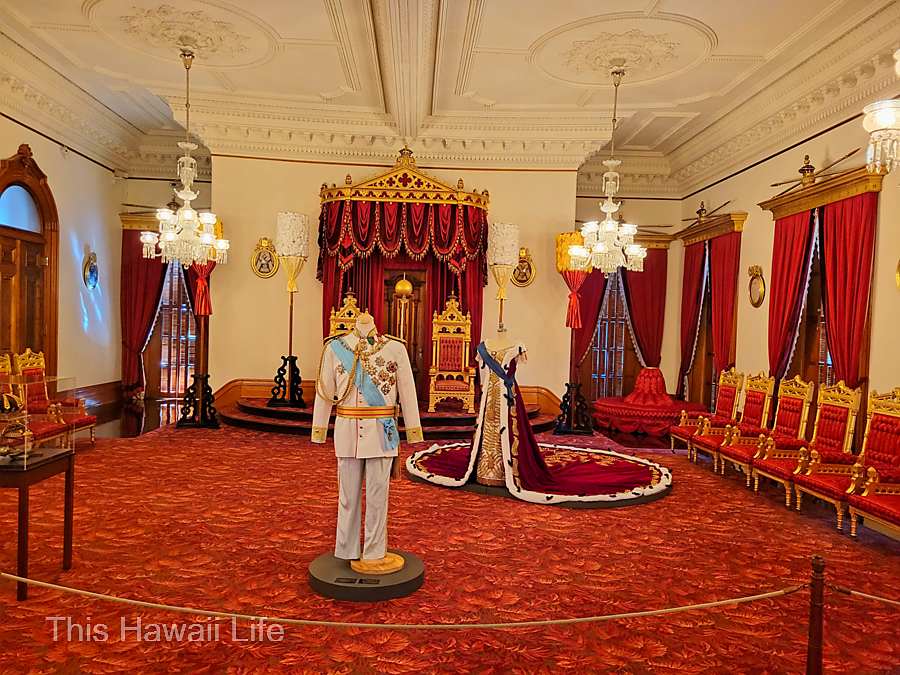
Check ou this video tour experience of the Iolani Palace below
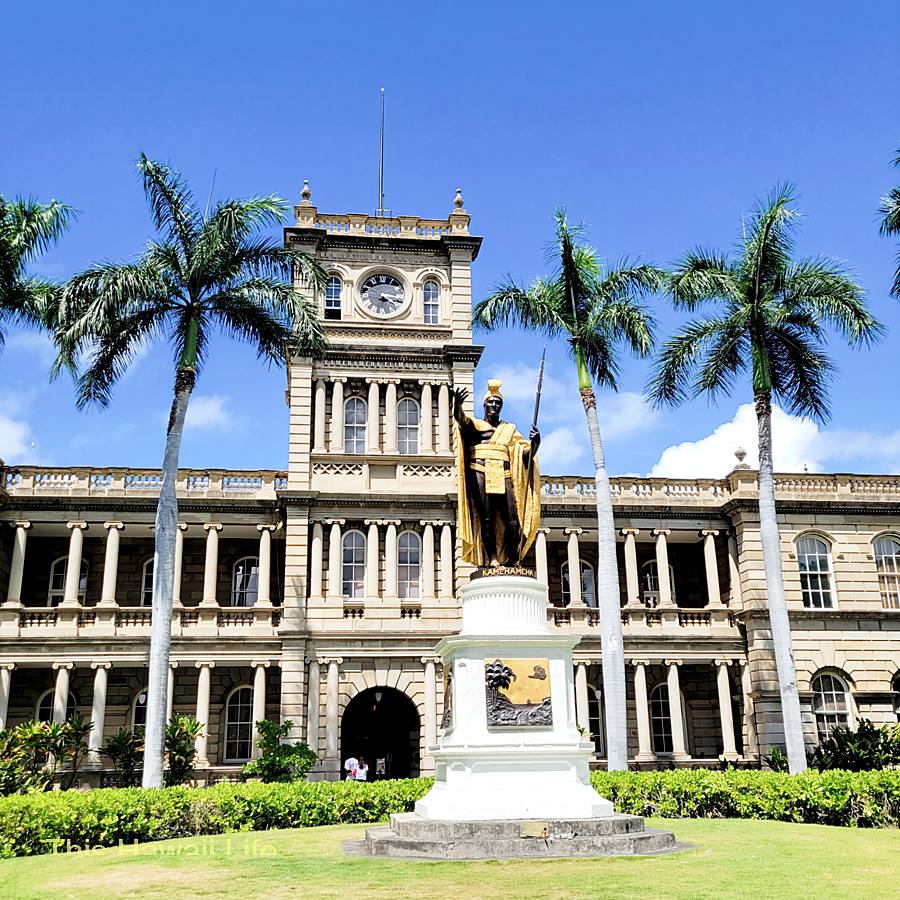
King Kamehameha Statue
This historic statue of the first king of Hawaii is impressive and fronts a gorgeous Neo-Classical building called Ali’iolani Hale which is now the State Judicial Building of the Hawaii Supreme Court. Creating a striking presence to the landscape the statue of the first king is revered and on his birthday a lei draping ceremony is held there in his honor.
The Kamehameha statue is a popular stop for capturing photographs of the statue that symbolizes the historic district of downtown and Hawaii in general.
Check out this video tour and history of the King Kamehameha Statue in downtown Honolulu below

Ali’iolani Hale
An Italian Rensaissance styled building that was built originally as a royal palace and then converted into administration center for the Hawaiian government. Afterwards Ali’iolani Hale was then turned into a judicial building housing the Hawaiian Supreme Court.
Tip – You can sign up for tours of the building at certain times each month on their calendar here for more details.
Here’s a video tour of Ali’iolani Hale and it’s unique history below

Washington Place
The regal mansion is where the current governor resides but it was officially the home of Hawaiian nobility and the last queen of Hawaii, Liliu’okalani, who lived there until she passed away. This stately home is located right next to St. Andrew’s Cathedral
Tours are given in the public areas of this historic home and you can check the website here for details on visiting time frames and making a reservation to visit the official home.
Here’s a video tour of Washington Place below

State Capital Building
The Hawaii State capital building is a contemporary design located behind the Iolani Palace and houses the executive and legislative branches of the state comprised of the Hawaii Senate and House of Representatives. The governor and Lieutenant governor also have their offices in this building.

The modern designed building coined as Hawaii International Architecture in the Bauhaus style is unique compared to capital buildings in the nation. Many natural elements are found or represented in the structure including a tiled reflecting pool that represents the ocean, cone shaped legislative chambers representing volcanoes, and the columns around the perimeter represents coconut trees. Built in an open air style with an open central courtyard that allows the elements of sun, wind, rain to enter the atrium area.
Here’s a quick video tour of the Hawaii State Capitol below

Hawaii State Art Museum
Located in a Hacienda styled building which houses two levels of the State art museum which showcases artists from Hawaii and work that carries Hawaiian themes covering culture, history, lifestyle and current topics and inter-island focused works. There is an outdoor garden area with sculpture that also features local artists from each island.
The museum maintains a huge permanent collection but also cycles through new shows and relevant issues that covers Hawaii’s ever changing environment through photographs, painting, mixed media and digital presentation.


Fantastic sculptures and installations
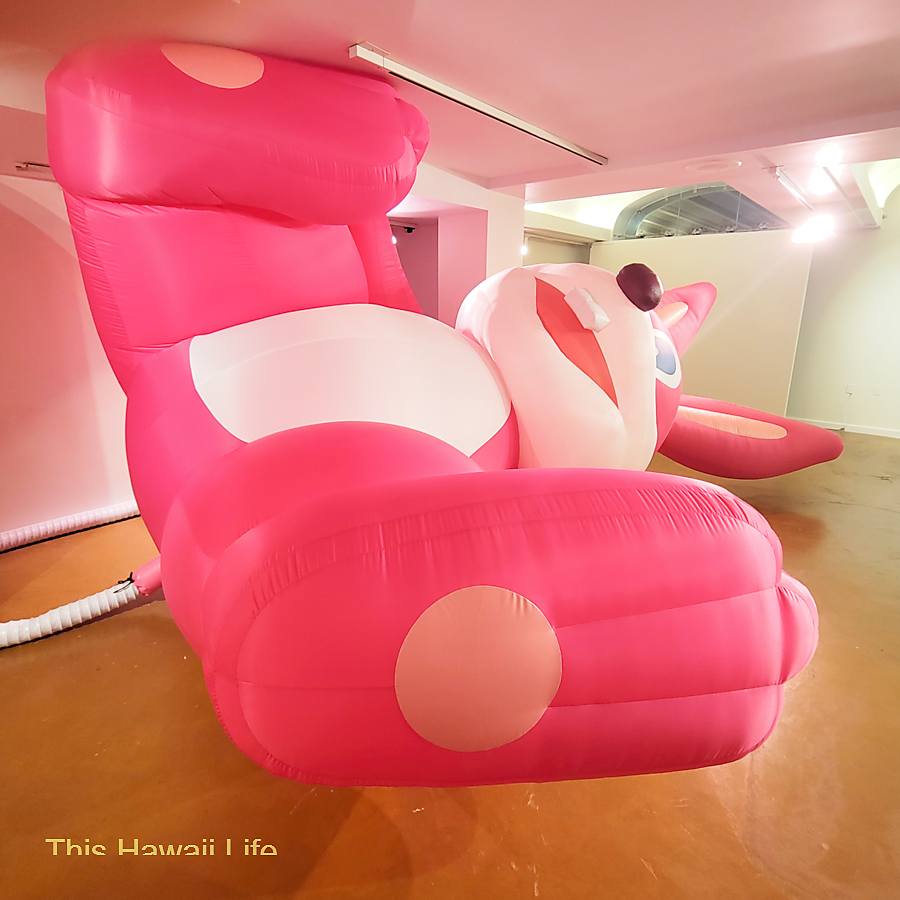
Here’s a video tour of the Hawai’i State Art Museum below
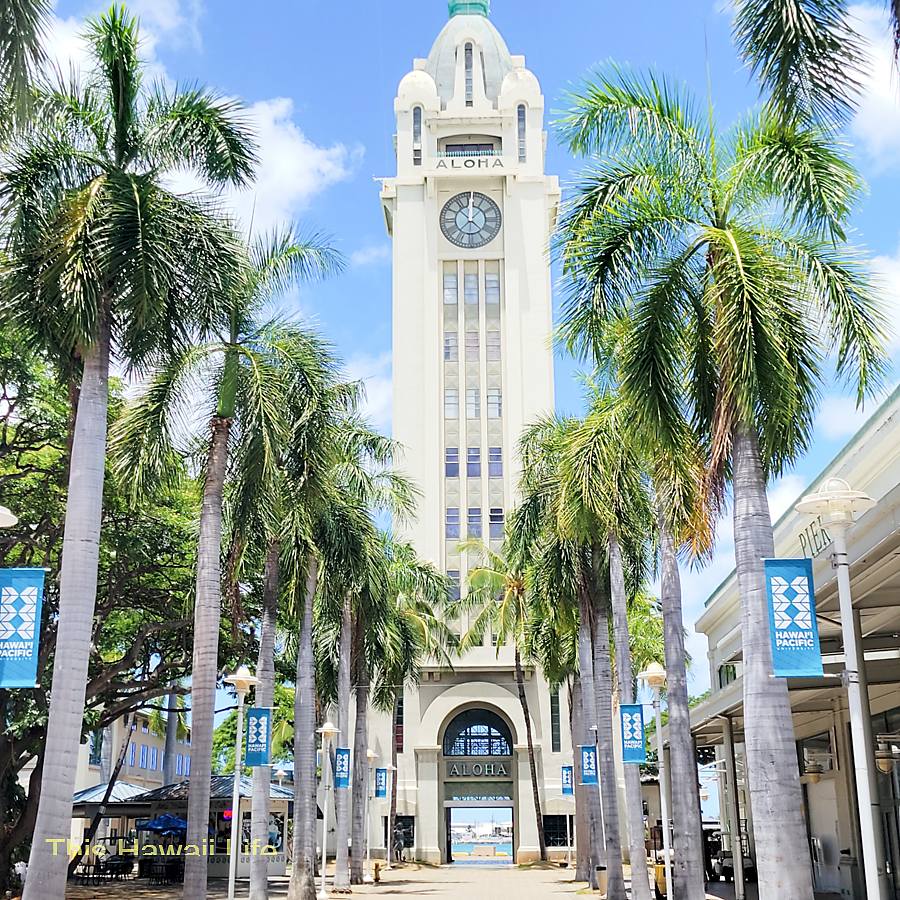
Aloha Tower
Located on the waterfront, the Aloha Tower was built in 1926 and was the official greeting place for passengers arriving by ship to the islands and was once the tallest building in the state. The complex is now housing a variety of shops and restaurants and you can climb up to the observation areas for views of the surrounding area.
Here’s a quick video tour of the Aloha Tower and shopping complex below

Chinatown
One of the largest Chinatowns in the downtown area, Chinatown still maintains its charms, restaurants and busy shops and outdoor mall complex. The older part of Chinatown with historic buildings have turned into more tourist driven attractions with art galleries and boutique stores along with the iconic Hawaii theater which hosts a variety of top entertainers and events regularly at this performance center.
Check out our post to visiting Chinatown here for more inspiration.
Check out this video tour of Chinatown and places to eat below
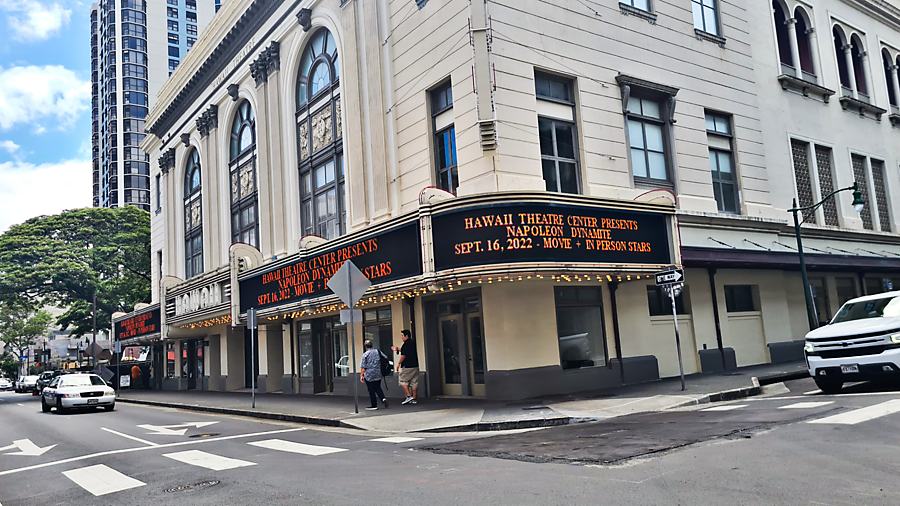

Kawaiaha’o Church
Located across from Iolani Palace this congregational church along with the Mission houses close by comprise the Hawaiian Mission Houses Historic Site, which was designated a U.S. National Historic Landmark in 1962.
Constructed between the reigns of Kamehameha II and III, the church was built between 1836 to 1842 from coral rock and is designed in the New England style of missionary churches of Hawaii. Originally the national church for the Hawaiian Kingdom, it is now the oldest Christian churches in Hawaii.
Check out this video highlights of the Kawiaha’a Church below

Hawaii Mission Houses Historic site of Honolulu
A complex of mission homes with the oldest western style building in Hawaii called Ka Hale Lā’au, or the old Mission House or The Frame House. Built in 1821, the home was made for the missionaries that mde this the first seat of the Sandwich Islands Missions.
The historic site comprises of three buildings and an archival collection that represents the Hawaiian Mission Houses historic site and archives.
Here’s a video Mission Houses historic site tour below

A thatched home replica at the Mission Homes complex

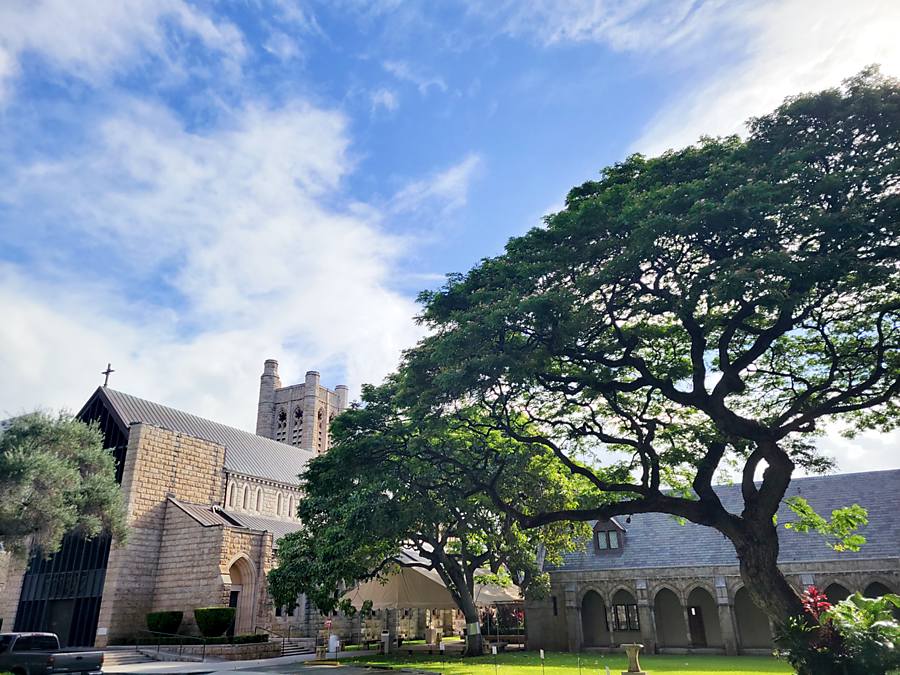
St. Andrew’s Cathedral
Originally this was the seat of the Anglican church of Hawaii and is now the home of the Episcopal Diocese of Hawaii. Inspired to create a church in the Anglican tradition, King Kamehameha IV and continued with his successor Kamehameha V who laid the cornerstone.
Built in a French Gothic architectural style, the cathedral was prefabricated and built in England and shipped to Hawaii including the stain glass pieces. The complex was added to the National Register of HIstoric places in Oahu in 1973.

Honolulu Hale
Downtown City Hall in the historic district is nice to see if you’re already in the downtown area. The place is very popular during the holidays with large Christmas displays on the outside and gorgeous Christmas tree themed designs around the interior complex.
The official office of the mayor of Honolulu for the city and county. The building is built in a Spanish Colonial revival style and is located in the historic downtown district of Honolulu.

Kaka’ako District
Just a short drive from the downtown district is an old industrial area of Honolulu called Kaka’ako. It has become more gentrified and trendy with the signature street art that is predominant all over the neighborhood. There are so many fun brew pubs, public events and gatherings and Salt which is an uber trendy hang out spot with food, galleries, shopping and fun hangout spots in this outdoor mall. You’ll love hanging out at Salt and checking out all the amazing street art in the area.
Check out our post to visiting Kaka’ako district here for more inspiration
Check out this trendy and fun district at Kaka’ako below
More inside tips to visiting downtown Honolulu
Discover Hidden Art Galleries: Downtown Honolulu is a hub for art enthusiasts, offering a multitude of hidden art galleries and studios. Take a stroll along Nuuanu Avenue and Bethel Street to find unique art spaces showcasing local and contemporary artwork. Keep an eye out for gallery openings and art walks to mingle with artists and discover new talents.
Seek out Local Eateries: While downtown Honolulu is known for its popular restaurants, don’t overlook the smaller, local eateries tucked away in side streets and alleys. These hidden gems often offer authentic and delicious Hawaiian dishes at more affordable prices. Ask locals for recommendations or explore areas like Fort Street Mall and Pauahi Street for a taste of local flavors.
Explore the Historic Districts: Beyond the major attractions, downtown Honolulu is brimming with historic districts waiting to be explored. Venture into areas like Merchant Street, Fort Street, and Queen Street to see well-preserved buildings dating back to the early 20th century. You’ll find architectural gems, quaint shops, and a glimpse into the city’s past.
Attend a Cultural Workshop: Immerse yourself in Hawaiian culture by participating in a cultural workshop. Look for opportunities to learn traditional crafts such as lei-making, hula dancing, or ukulele playing. Local community centers and cultural organizations often offer these hands-on experiences, providing a deeper understanding of Hawaiian traditions.
Visit the Farmers Market: Experience the vibrant local food scene by visiting the farmers market in downtown Honolulu. The Hawaii Farm Bureau hosts a popular farmers market every Wednesday at the Neal S. Blaisdell Center, offering an array of fresh produce, artisanal products, and tasty treats. It’s an excellent opportunity to support local farmers and indulge in farm-to-table delights.
Take a Historic Walking Tour: Join a guided historic walking tour to delve deeper into downtown Honolulu’s rich history. These tours often highlight lesser-known stories, architectural details, and hidden landmarks that you might otherwise overlook. It’s a fantastic way to gain a deeper appreciation for the city’s heritage.
Explore Independent Boutiques: Downtown Honolulu is home to numerous independent boutiques and specialty shops. Step away from the mainstream shopping centers and discover unique clothing boutiques, jewelry stores, vintage shops, and homegrown brands. These hidden gems offer a chance to find one-of-a-kind souvenirs and support local businesses.
Attend a Cultural Performance: Check local event listings or the Hawaii Theatre Center’s schedule for cultural performances and live shows. Experience the captivating sounds of Hawaiian music, traditional hula dances, or contemporary theater productions. These performances showcase the immense talent and cultural richness of Hawaii’s artistic community.
Relax in Parks and Gardens: Take a break from the urban buzz and find tranquility in the downtown parks and gardens. The Foster Botanical Garden, located just outside downtown, features a variety of tropical plants, while the Hawaii State Library offers a serene courtyard for peaceful moments amidst the city’s hustle and bustle.
For inspiration, check out our post on Oahu’s botanical gardens here for inspiration and images.
Engage with the Local Community: One of the best ways to truly experience downtown Honolulu is by engaging with the local community. Strike up conversations with shop owners, attend community events, or visit local cafes. This will not only provide unique insights but also foster connections and create meaningful memories.
By venturing beyond the major attractions, you’ll uncover the hidden treasures and lesser-known aspects of downtown Honolulu. Embrace the spirit of exploration, be open to new experiences, and allow the city to reveal its authentic charm and character.

Weather and best time to visit Honolulu
Honolulu, the capital city of Hawaii, generally enjoys a warm and tropical climate throughout the year. The best time to visit Honolulu depends on your preferences and what activities you have in mind. Here’s an overview of the weather and the different seasons in Honolulu:
Summer (June to August): Summers in Honolulu are warm and typically have high temperatures in the range of 85°F to 90°F (29°C to 32°C). The weather is generally dry during this time, with occasional rain showers. The ocean temperatures are also warm and ideal for swimming and water activities. However, summer is also the peak tourist season, so expect larger crowds and higher prices.
Fall (September to November): Fall in Honolulu is characterized by slightly lower temperatures and decreased tourist activity compared to summer. The temperatures range from 80°F to 85°F (27°C to 29°C). The weather remains relatively dry, making it a good time to visit if you prefer fewer crowds.
Winter (December to February): Winter in Honolulu is still warm, with temperatures ranging from 75°F to 80°F (24°C to 27°C). It is the rainy season in Honolulu, but rainfall is usually intermittent and doesn’t last long. The winter months also bring larger waves, making it an excellent time for surfers. Although it’s a popular time to visit, it’s not as crowded as the summer months.
Spring (March to May): Spring in Honolulu is similar to fall, with comfortable temperatures ranging from 75°F to 80°F (24°C to 27°C). The weather is generally dry and pleasant during this time, making it an ideal period to visit if you want to avoid crowds.
Considering the weather and tourist activity, the best time to visit Honolulu is generally during the spring (March to May) and fall (September to November) when the weather is pleasant, and the tourist crowds are relatively smaller. However, keep in mind that Honolulu is a popular tourist destination year-round, so it’s advisable to book accommodations and plan activities well in advance, especially during the peak summer months.
Check out these other fantastic places to visit around Oahu
Visit to Iolani Palace in Honolulu
Check out the Kaka’ako district in Honolulu
Top things to do around Honolulu and beyond
Explore the top attractions around Waikiki area
Pin this to your Hawaii board
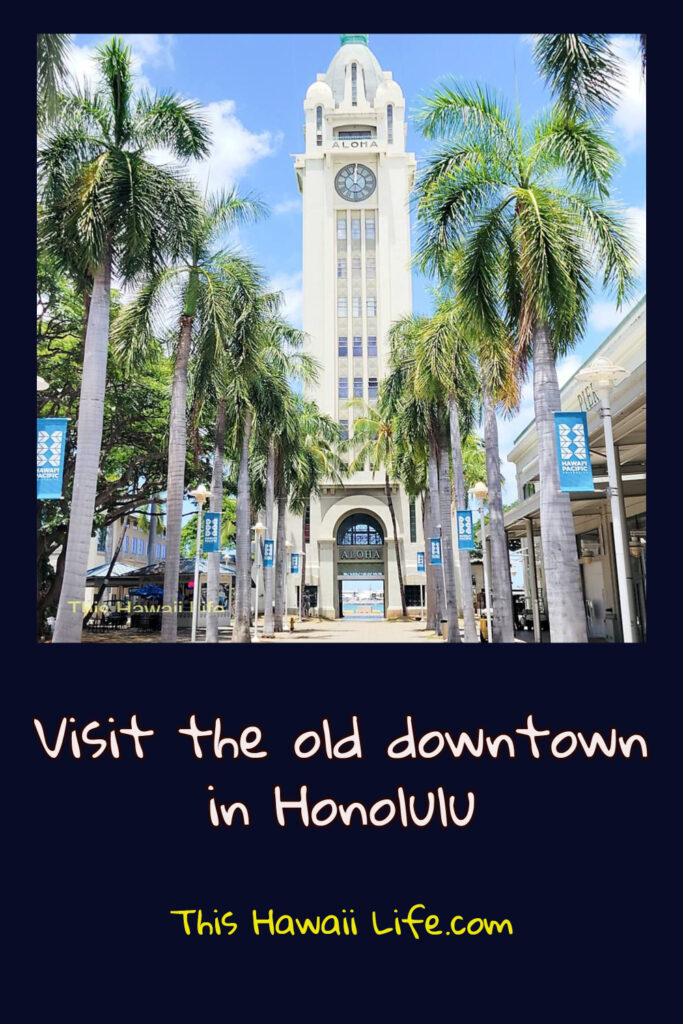
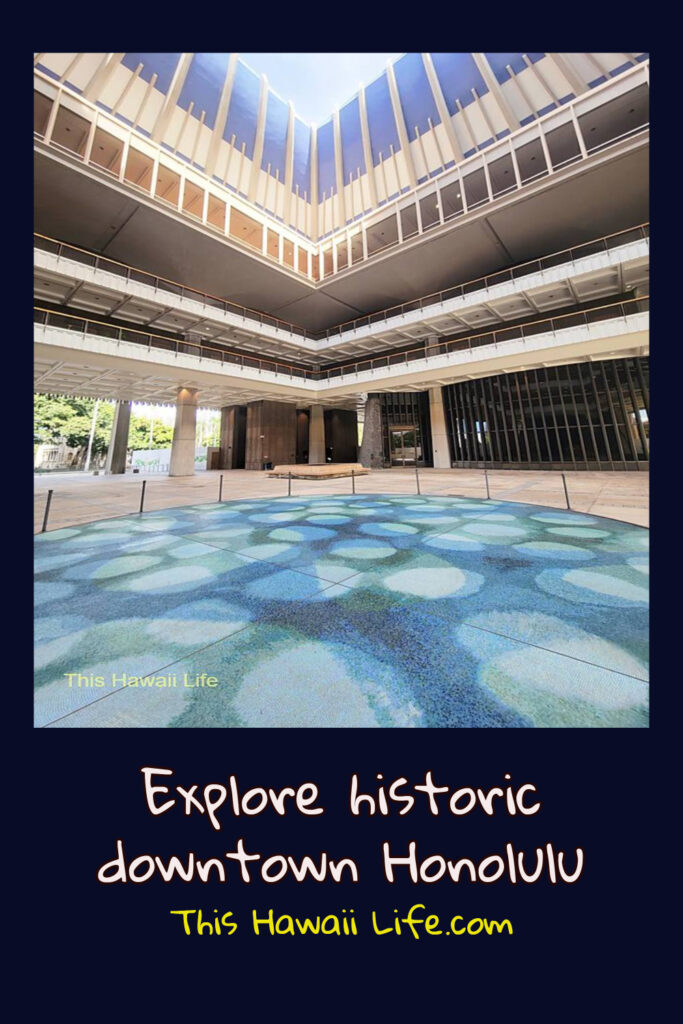
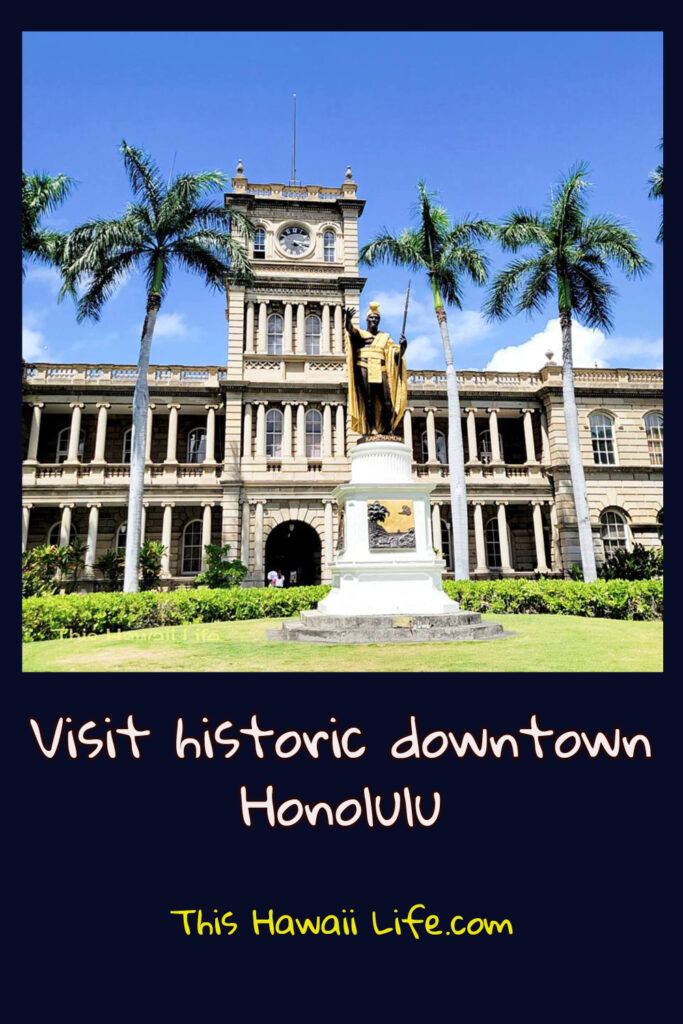
Where to stay in Downtown Honolulu
There are some hotels in the downtown Honolulu area that cater to the business center and the different districts around downtown. Check out these top reviewed accommodations here for current prices and availability.
Conclusion to visiting downtown Honolulu in Oahu
A visit to downtown Honolulu offers a captivating blend of history, culture, and urban vibrancy. From iconic landmarks to hidden gems, this bustling district invites you to immerse yourself in its unique charm. Explore the historic streets, savor local flavors, and engage with the vibrant community to truly experience the essence of downtown Honolulu.
Whether you’re strolling through art galleries, discovering local eateries, or embracing cultural workshops, the city’s dynamic atmosphere will leave a lasting impression. Soak in the aloha spirit, indulge in the diverse offerings, and create cherished memories in the heart of this captivating Hawaiian capital.
If you enjoyed the post please share with your friends or family and or use the social media buttons around the post.
Disclosure – some of the links above are to affiliate sites that are either reviews or recommendations if you book helps to keep our site running. We appreciate your supporting our website meanwhile
Mahalo again for visiting This Hawaii Life.
Author Bio – Noel Morata
Having lived in Hawaii for over 15 years, I’ve explored all the historic and cultural sites, tried delicious traditional food, fusion and local style dishes and learned a lot about growing and sustainability.
Hawaii for me is ever changing and I visit many of these places regularly for inspiration, changes that may occur, seasonality and cultural practises. I hope to share with you all the fascinating things and places I’ve learned grown appreciation for and hope that you will find the information helpful to visiting the islands.
I love showing visitors and guests to experience Downtown Honolulu and the surrounding area in Honolulu.


0 Comments
Trackbacks/Pingbacks